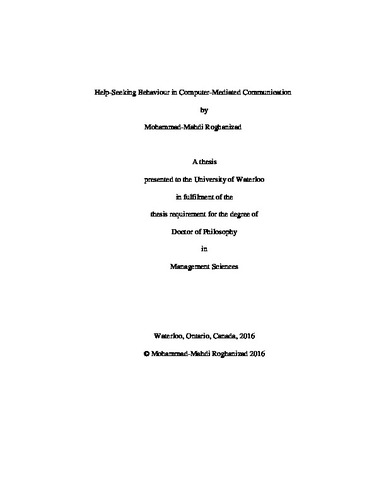| dc.description.abstract | Often when an individual decides to seek help, several communication media are available to him or her (e.g., email, phone, in-person), which means the help-seeker faces a media selection decision. To make this decision, a help-seeker may consider factors such as the convenience of, and his or her degree of comfort with, a given medium. He or she may also consider the effectiveness of each medium. In a series of five studies, I examine whether help-seekers are able to accurately assess the effectiveness of various communication media—specifically, requests made over email versus in-person. I find that egocentric biases distort the ability of help-seekers to accurately assess the effectiveness of email, which may lead them to choose less effective means of seeking help.
In Study 1, I find that a substantial percentage of help-seekers prefer email to face-to-face (FtF) communication when seeking help, due to the convenience email offers. In Studies 2 and 3, I find that helpers are far more willing to help when they are asked FtF than when they are asked via email; however, help-seekers predict the same level of compliance for the two media. Together, these two findings—greater convenience combined with inaccurate estimates of media effectiveness—may lead help-seekers to choose suboptimal media for making requests.
My findings for email requests are in contrast to numerous studies that have shown that people tend to underestimate the likelihood that others will comply with their direct requests. In Study 4, I explore the mechanism by which this highly robust FtF phenomenon is reversed in email communication. I find that help-seekers fail to recognize the extent to which feelings of trust and empathy, which drive helpers to help in face-to-face interactions, are lost through the use of email as the medium of communication. Help-seekers in this study mistakenly predict that helpers will experience the same levels of trust and empathy for email and FtF requests.
In Study 5, I examine the effect of ongoing relationships on predictions of media effectiveness. Surprisingly, a similar pattern was observed for friends and strangers; FtF requests are more effective than email requests for seeking help, even among friends, and requesters often fail to acknowledge this difference.
I conclude by discussing the theoretical and practical implications of these findings. A key takeaway is that people may easily be tempted to choose suboptimal media to seek help, leading to less help being granted overall. | en |

